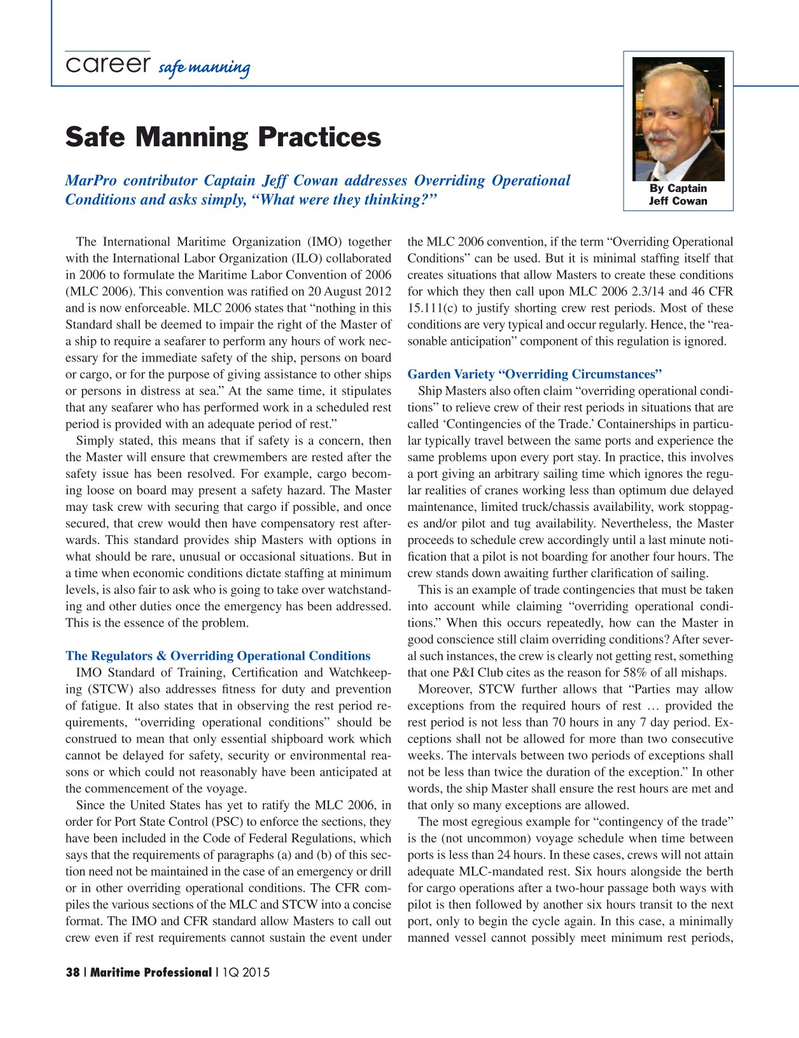
Page 38: of Maritime Logistics Professional Magazine (Q1 2015)
LNG Transport & Technology
Read this page in Pdf, Flash or Html5 edition of Q1 2015 Maritime Logistics Professional Magazine
career safe manning
Safe Manning Practices
MarPro contributor Captain Jeff Cowan addresses Overriding Operational
By Captain
Conditions and asks simply, “What were they thinking?”
Jeff Cowan
The International Maritime Organization (IMO) together the MLC 2006 convention, if the term “Overriding Operational with the International Labor Organization (ILO) collaborated Conditions” can be used. But it is minimal staf? ng itself that in 2006 to formulate the Maritime Labor Convention of 2006 creates situations that allow Masters to create these conditions (MLC 2006). This convention was rati? ed on 20 August 2012 for which they then call upon MLC 2006 2.3/14 and 46 CFR and is now enforceable. MLC 2006 states that “nothing in this 15.111(c) to justify shorting crew rest periods. Most of these
Standard shall be deemed to impair the right of the Master of conditions are very typical and occur regularly. Hence, the “rea- a ship to require a seafarer to perform any hours of work nec- sonable anticipation” component of this regulation is ignored.
essary for the immediate safety of the ship, persons on board or cargo, or for the purpose of giving assistance to other ships Garden Variety “Overriding Circumstances” or persons in distress at sea.” At the same time, it stipulates Ship Masters also often claim “overriding operational condi- that any seafarer who has performed work in a scheduled rest tions” to relieve crew of their rest periods in situations that are period is provided with an adequate period of rest.” called ‘Contingencies of the Trade.’ Containerships in particu-
Simply stated, this means that if safety is a concern, then lar typically travel between the same ports and experience the the Master will ensure that crewmembers are rested after the same problems upon every port stay. In practice, this involves safety issue has been resolved. For example, cargo becom- a port giving an arbitrary sailing time which ignores the regu- ing loose on board may present a safety hazard. The Master lar realities of cranes working less than optimum due delayed may task crew with securing that cargo if possible, and once maintenance, limited truck/chassis availability, work stoppag- secured, that crew would then have compensatory rest after- es and/or pilot and tug availability. Nevertheless, the Master wards. This standard provides ship Masters with options in proceeds to schedule crew accordingly until a last minute noti- what should be rare, unusual or occasional situations. But in ? cation that a pilot is not boarding for another four hours. The a time when economic conditions dictate staf? ng at minimum crew stands down awaiting further clari? cation of sailing.
levels, is also fair to ask who is going to take over watchstand- This is an example of trade contingencies that must be taken ing and other duties once the emergency has been addressed. into account while claiming “overriding operational condi-
This is the essence of the problem. tions.” When this occurs repeatedly, how can the Master in good conscience still claim overriding conditions? After sever-
The Regulators & Overriding Operational Conditions al such instances, the crew is clearly not getting rest, something
IMO Standard of Training, Certi? cation and Watchkeep- that one P&I Club cites as the reason for 58% of all mishaps.
ing (STCW) also addresses ? tness for duty and prevention Moreover, STCW further allows that “Parties may allow of fatigue. It also states that in observing the rest period re- exceptions from the required hours of rest … provided the quirements, “overriding operational conditions” should be rest period is not less than 70 hours in any 7 day period. Ex- construed to mean that only essential shipboard work which ceptions shall not be allowed for more than two consecutive cannot be delayed for safety, security or environmental rea- weeks. The intervals between two periods of exceptions shall sons or which could not reasonably have been anticipated at not be less than twice the duration of the exception.” In other the commencement of the voyage. words, the ship Master shall ensure the rest hours are met and
Since the United States has yet to ratify the MLC 2006, in that only so many exceptions are allowed.
order for Port State Control (PSC) to enforce the sections, they The most egregious example for “contingency of the trade” have been included in the Code of Federal Regulations, which is the (not uncommon) voyage schedule when time between says that the requirements of paragraphs (a) and (b) of this sec- ports is less than 24 hours. In these cases, crews will not attain tion need not be maintained in the case of an emergency or drill adequate MLC-mandated rest. Six hours alongside the berth or in other overriding operational conditions. The CFR com- for cargo operations after a two-hour passage both ways with piles the various sections of the MLC and STCW into a concise pilot is then followed by another six hours transit to the next format. The IMO and CFR standard allow Masters to call out port, only to begin the cycle again. In this case, a minimally crew even if rest requirements cannot sustain the event under manned vessel cannot possibly meet minimum rest periods, 38 | Maritime Professional | 1Q 2015

 37
37

 39
39
